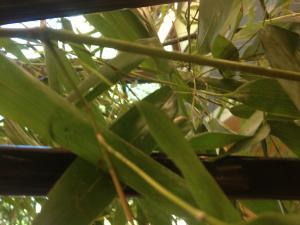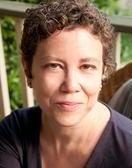
The three great agricultural festivals in Judaism–Sukkoth, Passover, and Shavuot–tie us to our ancient origins, when we lived in intimate relation to nature. During the week of Sukkoth, we build temporary outdoor huts (or tabernacles), cover them with branches, and festoon them with harvest fruits. We are commanded to eat and sleep in the Sukkah–to look up through the branches at the stars, and sense our own fragility, and the infinity of the universe. Sukkoth appeals in part because it draws on every child’s fantasy of living in a treehouse– of living off the land in the primal way depicted in My Side of the Mountain.
This week, I celebrated with traditional prayers and rituals in a Sukkah with my interfaith families community. One of our goals in interfaith education is to go beyond the most obvious Hanukkah/Christmas/Passover/Easter rotation of holidays–to go deeper into both religions. The elemental, natural, pagan elements preserved in Sukkoth please my interfaith soul.
I see every religion as fundamentally syncretic–as a historical accumulation of evolving influences rather than as something static and pure and singular. On Sukkoth, we stand in the Sukkah and shake a fruit called a citron or etrog, and a bound bundle of palm and myrtle and willow branches (the lulav) in six directions (north, south, east, west, to the skies, and to the ground). The parallel between this ritual and Native American rituals involving the cardinal directions has not gone unnoticed. The etrog and lulav are thought to originate in harvest fertility rituals, with the etrog representing the feminine, and the lulav clearly phallic. When we shake the lulav, we hear the sound of the wind, and invoke rain at the start of the ancient rainy season in the Middle East.
As urban-dwellers, and people of the scroll, we need to get outside more often–close our books and turn off our electronic phones and tablets, contemplate the sun and the stars, and get in touch with the elemental. Sukkoth provides that opportunity.
In autumn, our interfaith families community tends to feel very Jewish. On the heels of Rosh Hashanah and Yom Kippur and Sukkoth, we will celebrate Simchat Torah this week. We want our children to experience all these holidays, and feel connected to Judaism through them. But we also keep in mind that the Christian members of our families are celebrating with us. We provide context for every prayer and ritual, and give them ways to not only participate, but to lead.
And so this week, our musical director Marci Shegogue led us in the Sukkoth prayers. And then her husband Rich, who was raised Catholic, stood under the Sukkah, and led us in singing an 18th-century Christian hymn, perfectly suited to a Jewish agricultural festival, adapted and set to music by a nice Jewish boy from Long Island, Stephen Schwartz:
We plough the fields and scatter the good seed on the land,
But it is fed and watered by God’s almighty hand...
Schwartz took the words for “All Good Gifts,” along with most of the other Godspell lyrics, straight out of an Episcopal hymnal. As the daughter of a Jewish father and an Episcopalian mother, I find this fact resonant, and gratifying. The Hebrew prophet Zechariah predicted that in the end of days, all nations would celebrate “the feast of tabernacles” (Sukkoth) together. You could say that interfaith families gathered for Sukkoth are simply working on fulfilling this prophecy.

